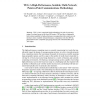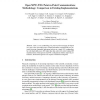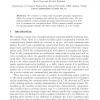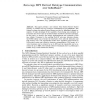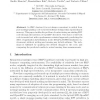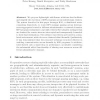110
click to vote
PVM
2004
Springer
15 years 7 months ago
2004
Springer
Abstract. TEG is a new component-based methodology for point-to-point messaging. Developed as part of the Open MPI project, TEG provides a configurable fault-tolerant capability f...
102
click to vote
PVM
2004
Springer
15 years 7 months ago
2004
Springer
TEG is a new methodology for point-to-point messaging developed as a part of the Open MPI project. Initial performance measurements are presented, showing comparable ping-pong late...
PVM
2004
Springer
15 years 7 months ago
2004
Springer
We consider a certain class of parallel program segments in which the order of messages sent affects the completion time. We give characterization of these parallel program segmen...
111
click to vote
PVM
2004
Springer
15 years 7 months ago
2004
Springer
The one-sided communication operations in MPI are intended to provide the convenience of directly accessing remote memory and the potential for higher performance than regular poin...
PVM
2004
Springer
15 years 7 months ago
2004
Springer
115
click to vote
PVM
2004
Springer
15 years 7 months ago
2004
Springer
In SMP clusters it is not always convenient to switch from pure message-passing code to hybrid software designs that exploit shared memory. This paper tackles the problem of restru...
PVM
2004
Springer
15 years 7 months ago
2004
Springer
We introduce a refinement strategy to bring the parallel performance analysis closer to the user. The analysis starts with a simple high-level performance model. It is based on fir...
101
click to vote
PVM
2004
Springer
15 years 7 months ago
2004
Springer
As the number of nodes in cluster systems continues to grow, leveraging scalable algorithms in all aspects of such systems becomes key to maintaining performance. While scalable al...
111
click to vote
PVM
2004
Springer
15 years 7 months ago
2004
Springer
On recent PC graphics cards, fully programmable parallel geometry and pixel units are available providing powerful instruction sets to perform arithmetic and logical operations. In...
134
click to vote
PVM
2004
Springer
15 years 7 months ago
2004
Springer
We propose lightweight middleware solutions that facilitate and simplify the execution of MPI programs across multidomain clusters. The system described in this paper leverages H2O...
